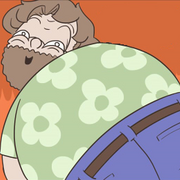|
I tear up men like Christian bodybuilding motivational speakers tear up phone books. Can't get enough male tears.
|
|
|
|

|
| # ? Apr 27, 2024 05:06 |
|
MALES feel free to TEAR up my bootyhole
|
|
|
|
that picture is actually an edit and she's drinking liquefied male ears, p weird and gross if you ask me but i wont judge her im not a misogynist
|
|
|
|

|
|
|
|
drinking actual tears would be gross imo. i wanna call her bluff.
|
|
|
|
those bitches! Sorry my friend!
|
|
|
|
BKPR posted:drinking actual tears would be gross imo. i wanna call her bluff. It would be almost as salty as "tears"
|
|
|
|
Misandry for Profit: Why so much TV was gynocentric Thereís a powerful, subtle irony when some Feminists attack capitalism. Capitalist funding [and through funding, substantial control] of television, was one of the major 20th Century supporters of feminism and female supremacism, if in a very backhanded way. The first widespread misandric themes in 20th Century mass media were�as best one can estimate�framed, choreographed and broadcast to pander to womenís control over�shopping. Capitalism tends to have a narrow social focus: It pays too much attention to the money and too little to the �side effects�. As television became widespread, programming was soon guided by the Profit Motive: The programs that were broadcast were those that advertisers would pay the most to broadcast. There were some social-policy restrictions, such as �no pornography where and when children might watch�, �donít insult peopleís race or religion�; and some imprecise limitations on violence. These restrictions probably caused more �domestic situation comedy� programs to be shown than would have �aired� without them. Advertisers pay for television�as they pay for any advertising medium�because they expect to get more profit from increased sales, than they pay out. Most of them aim the advertisements, and choose the programs with which to broadcast them, with shoppers in mind. Excellent television content that does not appeal to shoppers, is a �bad bet� for most advertisers. �Domestic situation comedies� were perhaps the commonest type of programming. They were mostly free of taboo erotica; they were nominally pro-family, but they were not very respectful of husbands. Why not?�because of the money. As regular comment-poster �Rebel� wrote, T.V. will continue to cater to women unless men start outspending women. Men shop less than women and have done as long as iíve been alive. The TV programming aimed at men�sports, especially�tended to be sponsored by the likes of shaving products and beers. Thereís a lot less money spent on shaving products and beer, than on all the things women buy, especially food, household supplies, and womenís clothing. (Ever go through the print advertisements in �content-analysis mode�, counting up the amount of space given to womenís vs. menís clothing?) After World War II, as television was becoming common, came the �Baby Boom�. Prosperity enabled men to support nuclear families without their wives having to earn money. Housewives became the chief shoppers and television programming catered to them�because they were the ones who spent the most money. As a student or junior professor in the 1960s or í70s�i no longer remember just when�i first met the phrase �The Jackass Formula�, a scripting type in which husbands were portrayed as bumbling fools and wives as smarter and wiser. It became the conventional structure of �domestic situation comedies�, and the obvious reason why television programming followed it, was that the advertisers wanted to please the main household spenders�who were wives. Since �The Simpsons� is better known to most readers than the television programming of decades past, iíll quote a passage i read recently about that program: ĎThe Simpsonsí follows the middle-class, Springfield-dwelling Simpson family. Homer Simpson is the caring but moronic head of the household, who works at the Springfield nuclear power plant for maniacal Springfield billionaire Montgomery Burns. His wife Marge puts up with his constant hair-brained ploys which have taken the family around the world and in contact with celebrities, famous athletes, and even presidents of the United States. Lisa is a know-it-all whoís dream is to become the first woman president and save the world of all its evils. Unlike his idealistic sister, Bart is a troublemaker at Springfield Elementary, always avoiding the bullies with his best friend Milhouse. Maggie is the youngest Simpson, always sucking on her pacifier, and who regularly seems to be forgotten by her family which gives her time to explore and cause her own mischief. [http://www.chacha.com/topic/the-simpsons;� accessed 14 October 2011] Fair characterization of men vis-a-vis women? Not at all. It might be just silly fun satire, if there were as many programs showing men as wiser and smarter, and women as silly-goofy�but are there? The sponsors�the marketers and retailers of commercial goods and later, services�were not keen to alienate The Shopper. Most of those silly and goofy women shopped. And so, the frailties of men, especially American men, were much more emphasized on the TV screen than were those of women. The �media image�, and especially the television image, of the average man, was inferior to that of the average woman�because men didnít shop much, while women spent most of the discretionary income their husbands earned. Because television was paid-for by advertising, it was consumer-�driven�. Because women shopped more than men, the TV producers and advertising agencies that determined what would be shown, catered to women�including presenting a biased picture of the genders and their relative competence. Men were seldom portrayed as evil, but often as inept. Women were seldom portrayed as inept, often as superior to their menfolk, and as far as i recall, never was an American [or Canadian] woman portrayed as evil. This was the imagery of regular men-in-general and women-in-general that the first TV generation of children �grew up on�. The advertisers did not promote careerism to women*; their interest was in getting money from those women as shoppers. But they did promote a self-image to women of competence and superiority; while to men, they promoted a self-image of relative ineptitude and error-prone-ness�and being much more often, the butt of the jokes. They didnít likely believe what they broadcast about men (a majority of advertising and TV executives were men) but because women shopped, women held power over the broadcasting industry via their buying decisions, and the programming pandered to their egos. The kind of power women held, the �power of the purse,� is most easily influenced by catering to the purse-holder, and not at all easily influenced by rational criticism of that person. Putting the funding of television in the hands of advertising agencies and advertisers, whose goals were money (which money was spent by millions of individual women, much of it on mundane things like laundry soap and coffee), led to a mundane woman-pleasing style of programming. It led to what Feminists later called �gynocentric values� receiving priority over menís values and perspectives. The first TV generation of children soaked up those implicit, contextual, gynocentric messages. To the extent that parents chaperoned their childrenís television viewing, nearly all treated �situation comedies� as innocent fare, and were likely to censor the usual, traditionally-not-for-children �sex and violence�. (There were more masculine themes, especially Disneyís Davy Crockett series and �Westerns�, of which �the Lone Ranger� was perhaps the most prominent.** However, masculine themed programs were often set in the past [or �Outer Space�], most domestic situation comedies, in the present.) Television taught the generation that reached adult age between 1960 and 1985 consumerism, self-indulgence, and a gynocentric mindset that included female superiority. They were taught by example, much as the storytellers taught before even radio existed. But the storytellers were usually wiser, more disciplined, more answerable-to and representative of community wisdom as well as their own, than dependence on shopping decisions, made television. Storytelling is effective: How many hours did you spend in school and how many listening to real live storytellers? How much of value did you learn, from each �medium of communication?� By simple arithmetic, my own experience tells me my time with storytellers was more efficient learning time than my time in compulsory-school classrooms. Itís high time the menís movement took up storytelling and setting examples for boys. One simple way to work at this, could be to restore the Boy Scouts [which are in trouble in Canada today because of some �bad apples�] to what i remember when i was one. We did the old-fashioned Scout things: Hiking, camping, fishing, learning outdoor skills. I never got past First Class, partly because i entered late, but i do well remember our Scoutmaster, a university student and a fine example of young manhood, taking us camping in the winter as well as the warmer seasons. I remember campfire storytelling�about as good as my grandfatherís storytelling, which means mighty-good�and learning to work with other boys, to recognize that each of us had his own distinctive strengths to contribute, and to organize ourselves accordingly. I never got that from television. It was in that Scout troop (and from my grandfather) that i learned the �Jackass formula� was cheap biased thinking, or as a fellow student later said at university, �whoring after money with their pants on�. When Feminism bankrupts the government, or however post-Feminist governance comes into being, part of our reforms should restore to good grandfathers and Scouters, the honour they deserve.
|
|
|
|
Riddler no
|
|
|
|
MizPiz posted:Misandry for Profit: Why so much TV was gynocentric There is no way in hell I am going to read this.
|
|
|
|
Pumpy Muffinz posted:would cutting my dick off help? That would be just another industrial accident.
|
|
|
|
Pumpy Muffinz posted:There is no way in hell I am going to read this. Yea I immediately regret clicking on this "reading assignment"
|
|
|
|
1gnoirents posted:
I'm really sure I could beat her up.
|
|
|
|
glowing-fish posted:That would be just another industrial accident. I saw a guy rip his dick mostly off with a Ĺ" drill motor. His dick was hanging by a few dick threads and they were able to reattach it
|
|
|
|
Pretty weak novelty mug OP. Maybe get one with Garfield on it
|
|
|
|
uploaded thing to imgur, this on front page memes that make you think.
|
|
|
|
BKPR posted:memes that make you think. Education for a new generation old chap
|
|
|
|
I'm a 100% sure I can kick any misandrist in the butt.
|
|
|
|
Ruggan posted:Yea I immediately regret clicking on this "reading assignment" "feminism is going to bankrupt the country somehow but thats okay because i learned me all i need to know at my pee-paws knee"
|
|
|
|
drilldo squirt posted:I'm really sure I could beat her up. I got your back.
|
|
|
|
mookface posted:I saw a guy rip his dick mostly off with a Ĺ" drill motor. His dick was hanging by a few dick threads and they were able to reattach it WEll, yah. We have a pill that will make you harder than Chinese calculus, but you prolapse one vagina.
|
|
|
|
MizPiz posted:Misandry for Profit: Why so much TV was gynocentric
|
|
|
|
You expect me to edit that? I'd have to read it.
|
|
|
|
Trixie Hardcore posted:I tear up men like Christian bodybuilding motivational speakers tear up phone books. Can't get enough male tears. tears or tears?
|
|
|
|
Typical Pubbie posted:tears or tears? tears
|
|
|
|
I gotta cry more often, that stuff's delicious apparently
|
|
|
|
I've made more women cry than women have made me cry so I guess I'm winning the war against bitches
|
|
|
|
Trixie Hardcore posted:I tear up men like Christian bodybuilding motivational speakers tear up phone books. Can't get enough male tears. ...well except for your childhood where you were completely and totally owned.
|
|
|
|
mookface posted:I've made more women cry than women have made me cry so I guess I'm winning the war against bitches i don't think moms count
|
|
|
|
almost everything makes me just start crying and if a pretty lady gets some enjoyment out of it i am happy!
|
|
|
|
lonesomedwarf posted:almost everything makes me just start crying and if a pretty lady gets some enjoyment out of it i am happy! aw bud whats wrong *lays head on ur breasts*
|
|
|
|
drilldo squirt posted:I'm a 100% sure I can kick any misandrist in the butt. "im gonna kick yur rear end!!" - hank hill
|
|
|
|
every time a man tries to talk to me i stomp his peehole shut
|
|
|
|
Rhymenoserous posted:i don't think moms count It started with mother and then it was all the girls in the bathroom after i released the bees I caught at recess and then a consecutive series of scorned lovers
|
|
|
|
Ramsus posted:...well except for your childhood where you were completely and totally owned. Dad?
|
|
|
|
yikes sounds scary... just avoid women wherever possible imo,
|
|
|
|
Ghaz posted:yikes sounds scary... just avoid women wherever possible imo, gently caress bagels instead.
|
|
|
|
VendaGoat posted:gently caress bagels instead. or just be asexual  let you penis be swallowed up by ur belly let you penis be swallowed up by ur belly
|
|
|
|
Ghaz posted:or just be asexual Sorry, I like taking him out from time to time.
|
|
|
|

|
| # ? Apr 27, 2024 05:06 |
|
https://www.youtube.com/watch?v=T0xoKiH8JJM
|
|
|























